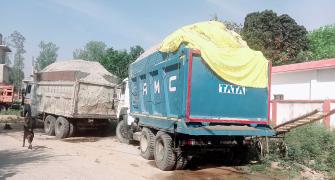With the rate of land degradation going up at an alarming pace, a study conducted by a non-profit organization claimed that Orissa could well turn barren and a land mass akin to a desert in the next 150 years.
"In many parts of the state, especially in the western and southern uplands, there are indications of desertification. They have further degraded from drought prone to desert prone areas," Water Initiative of Orissa, a wing of Sambalpur-based NGO, Mass, said in its study.
WIO coordinator Ranjan Panda said the study was done by analysing state government statistics and a public perception survey conducted by the NGO.
In just 13 years from 1991-92 to 2004-05, severely degraded land in the state had increased by 136 per cent, barren land had increased by 69 per cent and land converted to non-agricultural uses by 34 per cent, he said.
The land mass that had undergone marked changes during these years came close to seven per cent of the state's total geographical area, Panda said, adding that by 2004-05, as high as 17.5 per cent of Orissa had turned barren or unsuitable for agriculture.
"The way mineral and water guzzling heavy industries are being pushed, the fast pace of deforestation and mercurial behaviour of climate could cause desertification of state's land even faster," he said.
The WIO study said agricultural land in Rayagada and Jharsuguda, upcoming hubs of mineral-based industries, were shrinking very fast.
"In Rayagada district, unproductive land is nearly 174 per cent higher than cultivable land. Such land amount is as high as two-third of Jharsuguda's total cultivable area. The way land patches are rapidly becoming barren and degraded, desertification is anything but a reality now," the WIO report said.
The study warned desertification would impact the livelihood of millions of people as dependence on agriculture in the state was very high.
"It has estimated that 29 lakh hectares of land have already turned barren. According to the state agriculture department statistics, about 4.33 million hectares of state's 6.56 million hectares of agricultural land would suffer severe erosion and declining fertility. This is as high as 66 per cent of total agricultural land," it said.
Analysing the climate change, the study said information gathered from weather department indicated that the global mean temperature rose by 0.5 degree celsius in the last 50 years while state's temperature had risen by one degree celsius during the same time.
Actual forest cover had shrunk by 4,797 sq km although areas classified as forest land created by the state government had increased by 2,351 sq km, the report said.
"Soil erosion due to forest degradation is critical in 52 per cent of total geographic area of the state," it said.
"When the whole world has geared up to mitigate the challenges of desertification, situation in the state is starkly the opposite. There is hardly any effort seen at the state government level to recognize this threat and work towards mitigation of the problem. The government seems to be least concerned and its policies hardly reflect any commitment to address the situation," Panda said.







